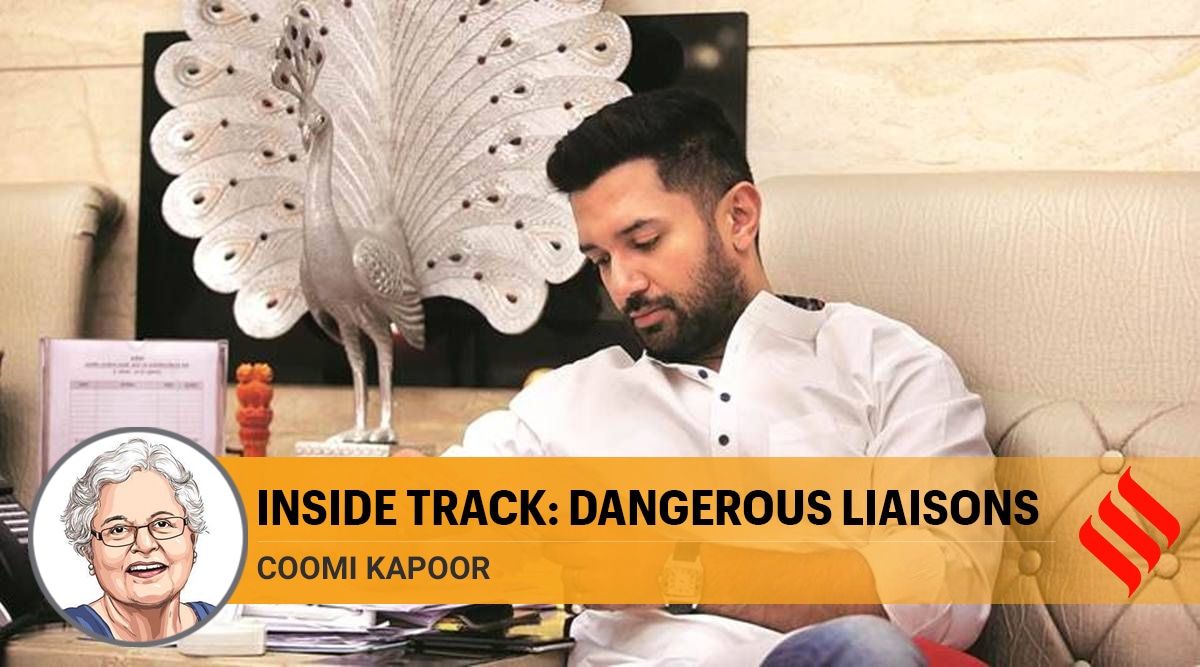 LJP President Chirag Paswan. (File)
LJP President Chirag Paswan. (File)Chirag Paswan is not so much a rebel as a pawn in the BJP’s two-faced poll strategy in Bihar. Paswan, fighting for a few more tickets, never dreamt that the BJP would permit the LJP to contest over 100 seats. The first hint of the BJP’s ambitions to be senior party in the alliance with Nitish Kumar was at a virtual conference a fortnight back when general secretary Bhupendra Yadav observed that the BJP invariably played second fiddle in Bihar. In Patna, during seat discussions, Yadav and Devendra Fadnavis were upset after the JD(U)’s Lalan Singh remarked bluntly that if the BJP was dissatisfied, it could contest on its own. The BJP believes Nitish’s popularity has plummeted after the migrant crisis, unlike Narendra Modi’s. However, it still needs Nitish’s backward caste vote, just as the JD(U) relies on the BJP’s forward caste support. The perils of being too clever by half is that Nitish, a seasoned defector, could jump to the RJD. Nitish compelled the BJP to announce his name as the CM candidate, but he cannot force the LJP not to carry posters of the late Ram Vilas Paswan with Modi. The BJP denies that its members are strategically shifting to Paswan’s party in some seats.
Tragic Deaths
Ram Vilas Paswan’s death adds one more to the list of ministers in Modi’s Cabinet who have passed away. Gopinath Munde was killed in an accident within a week of taking office in 2014. MoS Anil Dave died of a heart attack in 2017. Arun Jaitley, Sushma Swaraj and Manohar Parrikar passed away last year, although Parrikar had resigned his ministerial post. Last month, MoS Suresh Angadi was a victim of Covid.
Nothing Personal
One of the first to call on Jaswant Singh’s family after his death was Vasundhara Raje. Curiously, the former Rajasthan chief minister was believed to be responsible for Singh being denied the BJP ticket from the Barmer Lok Sabha seat and left no stone unturned to ensure his defeat in 2014. Modi, then Gujarat CM, had made it clear that he had no role in Singh’s expulsion from the party. One surmise for Raje’s surprising intransigence, even though Singh was an old friend, was that she wanted her son Dushyant appointed minister at the Centre if the BJP won. She saw Singh as competition to her son. Another speculation is that a soothsayer had predicted the 2014 election would throw up a hung Parliament and Raje could emerge as a dark horse for leadership given her good equations with Naveen Patnaik and Chandrababu Naidu. Singh was seen as a potential rival.
Wrong Target
The SP and four police officers handling the Hathras case have been suspended and if the fall-out continues the next casualty could be UP DGP Hitesh Awasthi. But there’s another Awasthi whose role warrants scrutiny. The all-powerful UP’s Additional Chief Secretary (Home), Awanish Kumar Awasthi, whose orders are followed blindly. During Awasthi’s tenure of little over a year, the UP police has been regularly in the news, whether it is the follow-up of the rape cases in Shahjahanpur and Unnao or Vikas Dubey’s gang gunning down eight policemen. The police subsequently “eliminated” Dubey and his men. No one has questioned Awasthi (IAS) as to why a Dubey gang member was at the wedding of his daughter last November. Awasthi’s wife is a well-known singer who tweets regularly in favour of Modi. After Hathras, some in the UP police are becoming resentful over being frequently made scapegoats by the IAS inner circle. He was, however, removed from the post of Additional Chief Secretary of Information Department earlier this month.
Jinnah Set Trend
Pakistan’s lack of democratic tradition is blamed on army. But it was Muhammad Ali Jinnah who first planted seeds for the authoritarian rule. Instead of strengthening constitutionalism in the new nation, he insisted on being governor-general, a ceremonial post. He then passed amendments to control the executive. He perpetuated a vice-regal system which gave governor-general and provincial governors veto powers on many issues, to the detriment of the parliamentary system. Interestingly, except in Sindh, all Pakistani governors were Englishmen and so were chiefs of the army, navy and air force, as was Jinnah’s financial adviser. This unexplored facet of the Quaid-e-Azam is brought out in Pakistani scholar Ishtiaq Ahmed’s recent biography of Jinnah.
📣 The Indian Express is now on Telegram. Click here to join our channel (@indianexpress) and stay updated with the latest headlines
For all the latest Opinion News, download Indian Express App.